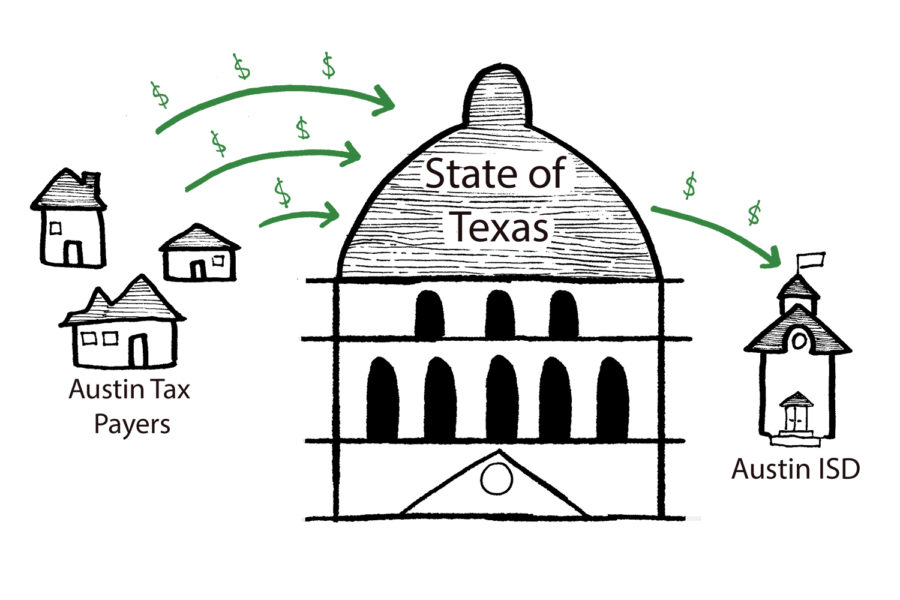School finance reform is needed in legislative session
If the Legislature doesn’t reform our broken education system, the district will face dire consequences. District officials have warned that they may be forced to increase class sizes, lay off teachers and close campuses.
February 28, 2019
Austin ISD is in crisis mode.
The district has worked to alert parents, teachers, and other stakeholders that the state school finance system has been siphoning off local tax dollars from Austin schools for years and the problem has only gotten worse recently.
Facing the Problem
If the Legislature doesn’t reform our broken education system, the district will face dire consequences. District officials have warned that they may be forced to increase class sizes, lay off teachers and close campuses. Classroom sizes will continue to grow and the district will lack the resources to fulfill its students’ needs. The district’s students could underperform due to overcrowding, resulting in lower test scores on mandated state tests. If the education funding system isn’t reformed it not only affects teachers and students but also affects communities all over the state.
Although state lawmakers have been reluctant to increase funding for public schools in the past, newly elected Texas Speaker of the House Dennis Bonnen and Gov. Greg Abbott have made education reform a top priority for this legislative session. e Texas House has called for the addition $7 billion into public schools. Meanwhile, leaders in the Texas Senate are proposing giving schools $3.7 billion to provide $5,000 pay raises to teachers.
The talk about increasing education funding is encouraging to school administrators and teachers who are worried about how school districts like Austin ISD are treated by the state’s school nance system. However, they remain skeptical that the state Legislature will actually make meaningful changes to the state’s so-called “Robin Hood” school nance system that takes money from property wealthy districts and gives it to other property-poor districts.
The Root of the Problem
If the Legislature wants to reform education they need to tackle the Recapture/Robin Hood problem or do away with the law entirely. In 2013, a state district court ruled “that the way the state funds its public schools is unconstitutional, both because the money is insufficient and because it is not distributed fairly,” Judge John Dietz ruled.
Some argue that recapture funds have been misused like in the case of La Joya ISD, which used $20 million it received from recapture to have its own water park.
The state’s Robin Hood law was the result of a Texas Supreme Court, which ruled that the state had to equalize the amount of school funding provided to public schools in Texas. Although the original Robin Hood plan had a good intent, it has led to the current situation to where districts like Austin are sending almost half of local tax dollars back to the state to be sent to other districts, leaving it without the ability to cover the basic needs of Austin school children.
This year, recapture has cost AISD $670 million, 46 percent of the district’s budget. The amount of money AISD sends to the state is expected to go up as property taxes get higher every year Austin ISD sends more recapture payments than any other school district in the state.
Priorities of Importance
Austin ISD has outlined a number of priorities that are imperative for it to receive relief and keep functioning.
- Freezes or limit the amount of recapture collected by the state under Chapter 41, Texas Education Code
- Keep all local property taxes in public education and pass a constitutional amendment that allows voters to decide whether to return state funding to at least 50 percent of the cost of maintaining and operating public schools
- Keep public schools governed by locally elected school board members, with a recognition by the state that elected board members are responsive to the needs of their local taxpayers and students
- Funding for full-day pre-kindergarten
- Increase sustainable state revenue sources to reduce the current over-reliance on local property taxes as a revenue source
- Pass a constitutional amendment to authorize a school district the flexibility to grant a property tax exemption to its teachers and other employees for the amount of ad valorem taxes imposed on a homestead for general elementary and secondary public school purposes
Main Source of Funding
The main way of funding for schools in Texas is through property taxes as of now our system relies too heavily on property taxes. Property taxes have gone up but haven’t helped schools because most of it goes to the state and is redistributed unfairly. AISD school finance AISD chief financial officer Nicole Conley Johnson suggests that diversifying the revenue of how schools receive more ways of funding than just through property taxes is through local sales tax.
Unfortunately, these ideas were quickly excluded by the school finance commission. Republican leaders have proposed using general revenue growth and severance tax revenue generated from oil and gas production to pay for property tax relief and schools.
Solutions for Funding
Another way of funding schools without the reliance on property tax is through the Texas state lottery, which sends about 27 percent of it’s revenue to education. According to the Texas lottery website, it has contributed around $20 billion to education since 1997. However, TEA (Texas Education Agency) officials say it’s difficult to determine which Texas school districts receive lottery funding.
The Texas “Rainy Day fund” hasn’t been touched for school funding, which is a debate that state lawmakers will likely debate about how and when it should be used.
The Rainy Day Fund contains nearly $12 billion, which is also the largest (ESF) economic stabilization fund in the United States. The rainy day fund is essentially the state’s savings account. Gas and oil production has grown the Rainy Day fund, which was originally intended for natural disasters or an economic emergency.
Given the emergency of education being massively underfunded and funds not being distributed fairly the state could fund schools with the rainy day fund.
There are multiple ways to fund schools, but the question remains on whether the Legislature will take action on this problem before it is too late and Austin ISD is forced to take drastic actions to keep the doors open next year.








